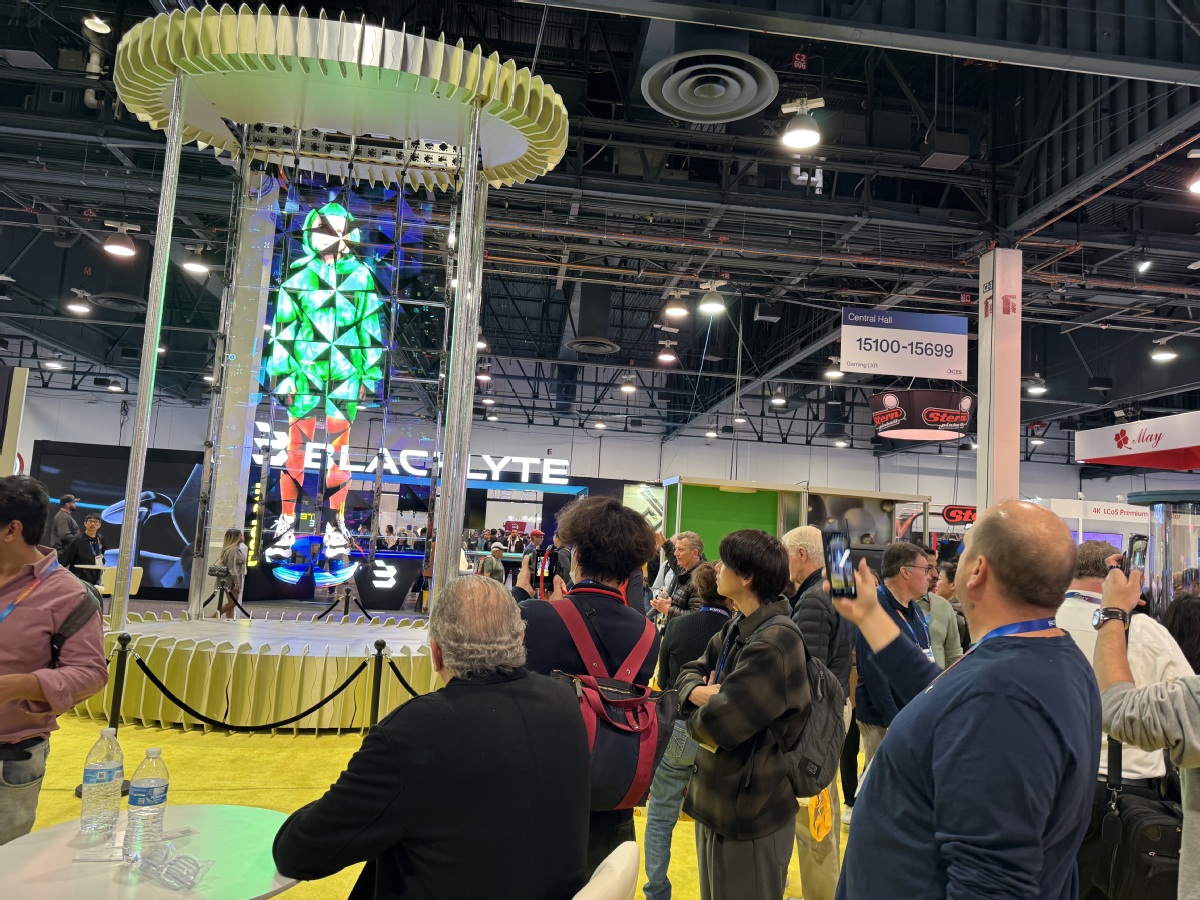
Attendances are captivated by a stunning life-sized holographic display at CES 2025, redefining the boundaries of digital innovation. RENA LI/CHINA DAILY
Opportunities for collaboration in technology and innovation between China and the US remain promising despite political challenges, according to Don Graves, deputy secretary of the US Department of Commerce.
In an interview with China Daily at CES, the world's largest annual consumer technology trade show in Las Vegas, Graves underscored the importance of finding common ground, particularly in addressing global challenges like climate change.
"We need to continue exploring ways to collaborate effectively," Graves told China Daily on Wednesday after participating in a "Conversation with US Government Leaders" session.
"There are certainly areas where our companies can work closely together. For example, addressing climate change should be a priority for both of our countries. Recognizing the changing climate, we have a real opportunity to join forces on this critical issue," he said.
Graves also highlighted the potential for the US and China to jointly develop global standards, given the size and influence of their economies.
"Too often, we focus on areas of conflict and overlook the opportunities for partnership. While safeguarding our national security remains essential, we should also seize the chance to foster collaboration between our countries and companies," he added.
The interconnectedness of the US and Chinese technology markets is evident at CES, where Chinese companies have a notable presence. More than 1,300 Chinese companies participated in the event, including 1,212 from the Chinese mainland and 98 from Hong Kong. Together, they accounted for more than a quarter of the 4,500 registered exhibitors, making China the largest foreign participant at CES 2025.
In addition to major tech companies like TCL and Hisense, participation by Chinese small- and medium-sized enterprises (SMEs) at the exhibition is rebounding. Among the exhibitors, Qingdao Thunderobot Technology, a subsidiary of Haier Group, displayed a range of esports products, including the world's first ZERO series of high-performance gaming laptops.
"We have entered major sales channels such as Amazon in North America for many years," David Guo, the company's founder and vice-president told China Daily.
"As we look to expand globally, we aim to reach more gaming enthusiasts around the world. That's why we are here at CES for the first time this year, hoping to provide more services and equipment to consumers in the US," Guo said.
In the two-wheeler sector, Komda Bicycles Ltd from Hong Kong displayed its lineup of sporting and recreation bicycles.
"We are an electric-vehicle manufacturer from China, and we have clients on both the East and West coasts of the US," said Terry Tsoi, the company's sales manager. He said that currently the US is the primary market because of Europe's tariffs, "which make exporting to Europe less advantageous. Of course, if the US further increases tariffs, it would also have a significant impact on us."
Chinese startups also were a strong presence at CES, particularly in the AI-driven technology space. Among them, Wisson Robotics displayed its AI-enhanced robotics featuring Pliabot muscles, joints and arms, drawing significant attention from attendees.
"Our company has shipped products to over 100 countries, including the US, and we recently completed an A round of investment, totaling nearly 30 million RMB," said Cheng Hui, a company representative.
The diversity of innovation extended to international exhibitors as well. At CES' Eureka Park, the French Pavilion hosted 100 companies, presenting a variety of technologies to a global audience, including China.
Elias Rock, head of Tech Pavilions at Business France Export, emphasized commitment to fostering collaboration with China, particularly in artificial intelligence.
"We have set up business offices in Beijing, Shanghai, Guangzhou and Hong Kong," Rock told China Daily. "We hope to foster our business and research collaborations between France and China, particularly in the field of AI technology."
As experts at CES 2025 highlighted, technology continues to serve as a bridge between the US and China, even amid broader geopolitical tensions. From advancements in AI and electric vehicles to efforts in sustainability and global standards, collaboration remains a critical pathway to addressing shared challenges and shaping the future of innovation.
During his keynote address on Monday, Nvidia founder and CEO Jensen Huang spoke to an audience of more than 6,000 about the company's advancements in agentic AI, autonomous vehicles, robotics and gaming. He emphasized their potential to drive innovation and reshape business and society.
In a subsequent briefing, Huang noted two major influences reshaping the automotive industry: Tesla and the rise of Chinese electric-vehicle companies.
"Emerging Chinese companies like BYD, Xpeng, NIO and Xiaomi are showcasing advanced technologies and exceptional autonomous driving capabilities, which they are now promoting on a global scale," he said. "These technological breakthroughs are setting a new standard for future vehicles, emphasizing the importance of robust autonomous driving capabilities."
"We don't live in the virtual world. True connection comes when we're standing together, sharing the same space," said Delta CEO Ed Bastian at the carrier's 100th anniversary celebration on Tuesday, where he announced a set of tech initiatives leveraging generative AI.